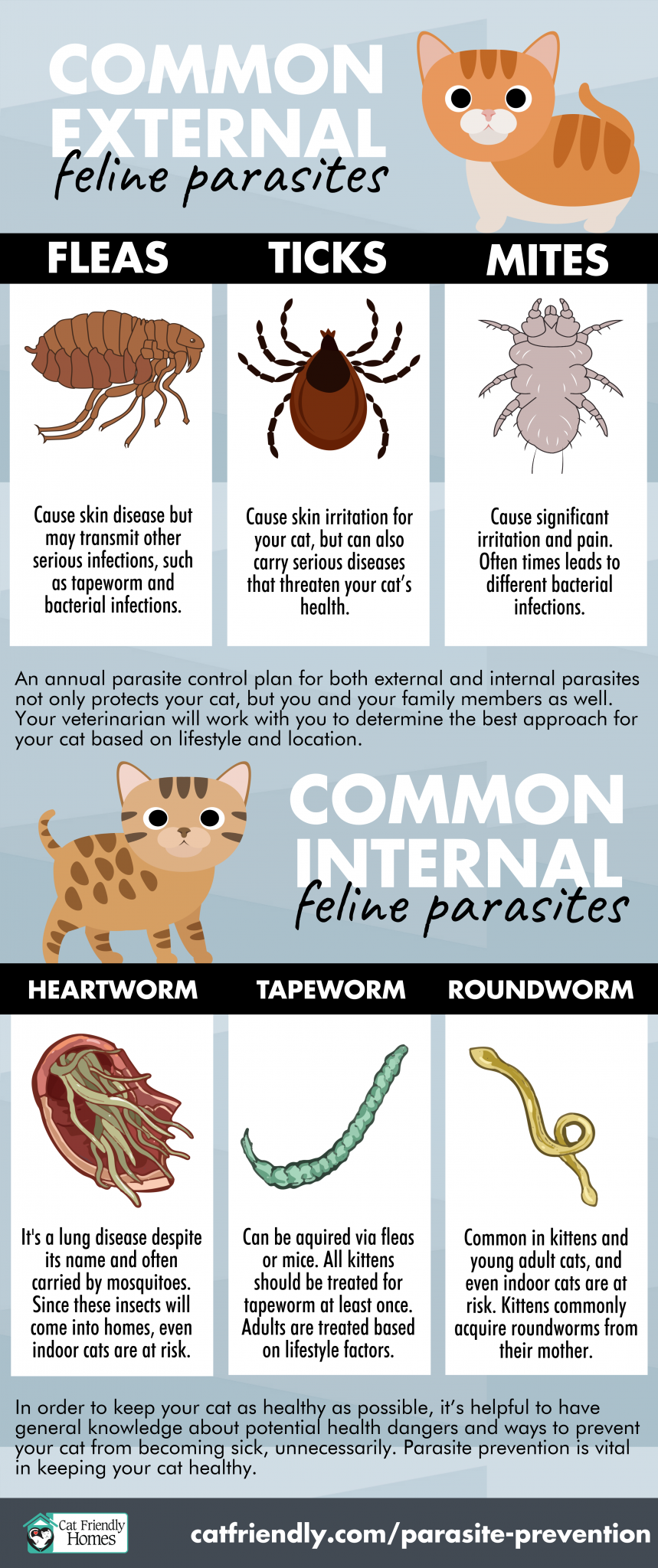Parasite control is an integral part of your cat’s wellness program and year-round preventive care is essential. Parasites affect your cat’s health and some, referred to as “zoonotic parasites,” are transmissible to people as well.
For example, flea infestation prevention for your cat can protect the entire family from “cat scratch disease,” caused by the Bartonella bacteria, which is carried by fleas. Another important zoonotic parasite to be aware of is roundworm, which can cause vision impairment and blindness in people. An annual control plan for both external and internal parasites not only protects your cat, but you and your family members as well.
Types of Parasites
There are two main types of parasites: external and internal. External parasites are those found on the hair and skin of cats. Internal parasites live in your cat’s internal organs, such as the intestinal tract or lungs.
By definition, a parasite is an organism that lives on or in a host organism and gets its food from or at the expense of the host.
External Parasites
Fleas
- Found almost everywhere in the world.
- All cats are at risk of flea infestation, but those at highest risk include cats that have access to outdoors, cats living with other pets that go outdoors, and cats in multi-cat homes or environments.
- There are many flea control products on the market but not all are equally safe for cats, so your veterinarian should always be consulted before you apply a product. In particular, many products intended for dogs ARE NOT safe for cats as they can/may contain permethrin which is toxic to cats.
- Fleas cause skin disease, but they may transmit other serious infections, such as tapeworm and bacterial infections. Young kittens can become severely anemic from flea infestations.
Ticks
- Vary in type and distribution depending on where you live.
- They can not only cause skin irritation for your cat, but can also carry serious diseases that threaten your cat’s health such as parasites that infect blood cells.
- Tick prevention products intended for dogs ARE NOT safe for cats.
Mites
- Common parasites of cats, especially ear mites, which cause significant irritation and pain and can lead to bacterial infections.
- Other types of mites live on feline skin, such as mange mites, and cause hair loss, itchiness, and may lead to bacterial infection.
Internal Parasites
Roundworm
- Common in kittens and young adult cats.
- Cats can acquire roundworms via several routes, so even indoor cats are at risk.
- Kittens commonly acquire roundworms from their mother, so all kittens should be treated for this parasite.
Tapeworm
- Can be acquired via fleas or when cats hunt and eat prey such as mice.
- All kittens should be treated for tapeworm at least once and adults are treated based on lifestyle factors.
Heartworm
- An important lung disease despite its name.
- The parasite is carried by mosquitoes and since these insects will come into homes, even indoor cats are at risk.
- Wherever canine heartworm infection is found, cats will become infected too, and should be on a regular preventive product.
What You Need to Know
The type of parasites that are most important to focus on for your cat will depend on your cat’s age, lifestyle, seasonality, and where you live. It’s important to note that even indoor cats need parasite prevention since there are many ways parasites can enter your home, such as via insects. All kittens require a schedule of parasite treatments since they are at increased risk. Adult cats also require regular treatment based on individual risk factors. Your veterinarian will work with you to determine the best approach for your cat based on lifestyle and geographic factors. In many areas, a year-round plan is the best approach for cats of all ages.
Prevention Treatments
Fortunately, there are a variety of safe and effective products on the market that are easy to apply to your cat and many will treat more than one type of parasite. Most parasite treatment and prevention products are applied topically through:
- Collars
- Sprays
- Spot-on formulations
Why Does My Indoor-Only Cat Need Parasite Prevention?
Parasites are everywhere and reside quite happily inside our homes and on our treasured cats. The reality is that many cats have very fluid lifestyles—they might spend most of their time indoors, but occasionally sun themselves on the back porch, live with animal housemates that go outdoors, or they go outside when their caregiver vacations at the beach cottage. While many cats are truly indoor-only house cats, they also enjoy killing and eating bugs. Insects can serve as transport or intermediate hosts for some of the more common intestinal parasites.
Anyone who’s been plagued by a buzzing mosquito or housefly knows how easily flying insects can gain access to even the most well-secured house. Heated, humidified homes can also be terrific breeding grounds for fleas, as well as a place of refuge for flea-carrying rodents. Exposure can happen when shoes and other clothing covered in contaminants fresh from the parasite reservoir are worn indoors. All of these instances create an opportunity for parasite exposure in a typical house cat.
Kittens
There is tremendous opportunity to prevent harm to your kitten by getting her dewormed. Kittens are frequently infected by intestinal parasites, and are prone to reinfection, which can occur during nursing and through her environment. To compound matters, kittens often harbor immature forms of parasites, which can escape the effects of treatments and confound diagnostic tests. Intestinal parasites, such as tapeworms, can also wreak havoc on your kitten’s organ systems.
Contributed by Dr. Susan Little, DVM DABVP (Feline)


